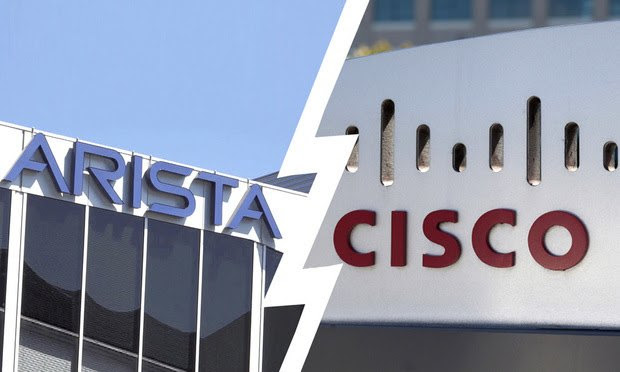Was Cisco v. Arista All Just a Bad Dream?
Cisco and Arista are seeking to vacate a judgment that was one of the first to apply copyright's “scenes-a-faire” defense in the software context.
September 07, 2018 at 05:26 PM
3 minute read
The original version of this story was published on Law.com
Update: On Monday, Sept. 10, the Federal Circuit granted Cisco's and Arista's request to send the case back to Judge Freeman.
Do you remember a couple of years ago when Cisco Systems and Arista Networks had that big copyright showdown in San Jose? Bob Van Nest of Keker, Van Nest & Peters faced off with David Nelson of Quinn Emanuel Urquhart & Sullivan. Cisco's John Chambers and Arista's Jayshree Ullal testified. Silicon Valley media watched it all closely.
OK, now pretend none of that ever happened. Especially the jury's verdict finding that Arista infringed, but that external factors other than Cisco's creativity dictated the selection, arrangement and organization of phrases in Cisco's command line interface.
That's what Cisco and Arista are now asking U.S. District Judge Beth Labson Freeman and the Federal Circuit to do. It turns out that, as part of their $400 million settlement, the networking giants are seeking to vacate the judgment—one of the first to apply copyright's “scenes-a-faire” defense in the software context. On Wednesday, Freeman indicated she's willing to oblige.
The parties now have to persuade the Federal Circuit to send the case back to Freeman without issuing a ruling. The appellate court heard arguments in the case in June.
Quinn Emanuel partner Kathleen Sullivan and Keker partner Steven Hirsch emphasized in their joint request to the Federal Circuit that the settlement resolves multiple disputes across district courts, the International Trade Commission and the Patent Trial and Appeal Board. “It is in the overall public interest for the court to support parties in negotiating and reaching settlement, including where vacatur is contemplated as part of a settlement, and especially where vacatur is part of a settlement that will resolve multiple pending disputes,” they wrote to the court.
Just to say it, this is a 100 percent about-face from the parties' initial public statement the day of the Aug. 6 settlement. “Arista and Cisco will continue to seek appellate court review of the scenes-a-faire verdict in the earlier trial regarding legal protection for user interfaces,” they said back then.
But seeking vacatur appears to have been the strategy all along. The parties' initial term sheet governing the deal, made public this week, states, “The Parties will jointly approach the District Court with legal grounds for vacatur to attempt to persuade the Court to vacate the judgment to facilitate a global settlement of all matters.'”
The Federal Circuit on Monday granted Cisco's and Arista's request to abort the appeal and send the case back to Freeman.
This content has been archived. It is available through our partners, LexisNexis® and Bloomberg Law.
To view this content, please continue to their sites.
Not a Lexis Subscriber?
Subscribe Now
Not a Bloomberg Law Subscriber?
Subscribe Now
NOT FOR REPRINT
© 2025 ALM Global, LLC, All Rights Reserved. Request academic re-use from www.copyright.com. All other uses, submit a request to [email protected]. For more information visit Asset & Logo Licensing.
You Might Like
View All
US Patent Innovators Can Look to International Trade Commission Enforcement for Protection, IP Lawyers Say

Attorney of the Year Finalist: Michael Rubin, Latham & Watkins

John Hueston Appointed Monitor by CA Court Judge in Ruling on Veterans' Housing Case

Ex-Federal Prosecutor and White-Collar Defense Lawyer Joins Foundation Law Group
Trending Stories
- 1'A Death Sentence for TikTok'?: Litigators and Experts Weigh Impact of Potential Ban on Creators and Data Privacy
- 2Bribery Case Against Former Lt. Gov. Brian Benjamin Is Dropped
- 3‘Extremely Disturbing’: AI Firms Face Class Action by ‘Taskers’ Exposed to Traumatic Content
- 4State Appeals Court Revives BraunHagey Lawsuit Alleging $4.2M Unlawful Wire to China
- 5Invoking Trump, AG Bonta Reminds Lawyers of Duties to Noncitizens in Plea Dealing
Who Got The Work
J. Brugh Lower of Gibbons has entered an appearance for industrial equipment supplier Devco Corporation in a pending trademark infringement lawsuit. The suit, accusing the defendant of selling knock-off Graco products, was filed Dec. 18 in New Jersey District Court by Rivkin Radler on behalf of Graco Inc. and Graco Minnesota. The case, assigned to U.S. District Judge Zahid N. Quraishi, is 3:24-cv-11294, Graco Inc. et al v. Devco Corporation.
Who Got The Work
Rebecca Maller-Stein and Kent A. Yalowitz of Arnold & Porter Kaye Scholer have entered their appearances for Hanaco Venture Capital and its executives, Lior Prosor and David Frankel, in a pending securities lawsuit. The action, filed on Dec. 24 in New York Southern District Court by Zell, Aron & Co. on behalf of Goldeneye Advisors, accuses the defendants of negligently and fraudulently managing the plaintiff's $1 million investment. The case, assigned to U.S. District Judge Vernon S. Broderick, is 1:24-cv-09918, Goldeneye Advisors, LLC v. Hanaco Venture Capital, Ltd. et al.
Who Got The Work
Attorneys from A&O Shearman has stepped in as defense counsel for Toronto-Dominion Bank and other defendants in a pending securities class action. The suit, filed Dec. 11 in New York Southern District Court by Bleichmar Fonti & Auld, accuses the defendants of concealing the bank's 'pervasive' deficiencies in regards to its compliance with the Bank Secrecy Act and the quality of its anti-money laundering controls. The case, assigned to U.S. District Judge Arun Subramanian, is 1:24-cv-09445, Gonzalez v. The Toronto-Dominion Bank et al.
Who Got The Work
Crown Castle International, a Pennsylvania company providing shared communications infrastructure, has turned to Luke D. Wolf of Gordon Rees Scully Mansukhani to fend off a pending breach-of-contract lawsuit. The court action, filed Nov. 25 in Michigan Eastern District Court by Hooper Hathaway PC on behalf of The Town Residences LLC, accuses Crown Castle of failing to transfer approximately $30,000 in utility payments from T-Mobile in breach of a roof-top lease and assignment agreement. The case, assigned to U.S. District Judge Susan K. Declercq, is 2:24-cv-13131, The Town Residences LLC v. T-Mobile US, Inc. et al.
Who Got The Work
Wilfred P. Coronato and Daniel M. Schwartz of McCarter & English have stepped in as defense counsel to Electrolux Home Products Inc. in a pending product liability lawsuit. The court action, filed Nov. 26 in New York Eastern District Court by Poulos Lopiccolo PC and Nagel Rice LLP on behalf of David Stern, alleges that the defendant's refrigerators’ drawers and shelving repeatedly break and fall apart within months after purchase. The case, assigned to U.S. District Judge Joan M. Azrack, is 2:24-cv-08204, Stern v. Electrolux Home Products, Inc.
Featured Firms
Law Offices of Gary Martin Hays & Associates, P.C.
(470) 294-1674
Law Offices of Mark E. Salomone
(857) 444-6468
Smith & Hassler
(713) 739-1250







